Have a safe day!
Wednesday, July 10
3:30 p.m.
DIRECTOR'S COFFEE BREAK - 2nd Flr X-Over
THERE WILL BE NO FERMILAB COLLOQUIUM THIS WEEK
Thursday, July 11
2:30 p.m.
Theoretical Physics Seminar - Curia II
Speaker: Carlos Alberto Gomez Tarazona, Universidad Nacional de Colombia
Title: Contribution to the neutrino form factors coming from the charged Higgs of a two Higgs doublet model Type I, II
3:30 p.m.
DIRECTOR'S COFFEE BREAK - 2nd Flr X-Over
4 p.m.
Accelerator and Physics Technology Seminar (NOTE DATE) - One West
Speaker: Evan Sengbusch, Joe Sherman, Preston Burrows and Daniel Swanson, Phoenix Nuclear Labs
Title: A Long Lifetime, CW Negative Hydrogen Microwave Ion Source as a Project X Injector
Click here for NALCAL,
a weekly calendar with links to additional information.
Ongoing and upcoming conferences at Fermilab
|
|
Wednesday, July 10
- Breakfast: breakfast casserole
- Breakfast: ham, egg and cheese English muffin
- Chicken cordon bleu sandwich
- Smart cuisine: beef burgundy ragout
- Roasted turkey
- Turkey bacon panini
- Blackened chicken alfredo
- Chunky broccoli cheese soup
- Texas-style chili
- Assorted calzones
Wilson Hall Cafe menu |
|
Wednesday, July 10
Lunch
Guest chef: Teri Traum Welsh
- Grilled shrimp and tri-melon salad
- Guacamole and grilled-garlic toast
- Pear caflouti
Friday, July 12
Dinner
- Minted orange, fennel and red-onion salad
- Grilled lamb chops with hot red-pepper relish
- Lemon tarragon green beans
- Toasted bulgur with corn and tomatoes
- Individual berry cobbler with spiced cream
Chez Leon menu
Call x3524 to make your reservation.
|
|
Fermilab employees nominated for 2013 DOE Sustainability Awards
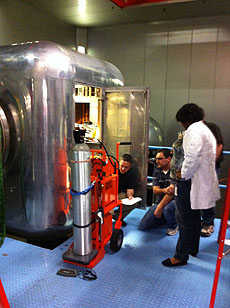 |
Fermilab employee Sylvia Wilson stands next to a portable DILO SF6 Gas Recovery System. Wilson and John Anderson were nominated for a DOE Sustainability Award for implementing a procedure that, using this system, helps reduce greenhouse gas emissions. Photo: Raymond Lewis, AD |
In late June, the Environmental Protection Group of the ESH&Q Section submitted five nominations for the 2013 DOE Sustainability Awards. These awards highlight DOE sites' efforts and accomplishments in minimizing pollution and energy use.
The categories and Fermilab's nominations include:
Green Buildings: Bill Frank, Gordon Gillespie, Todd Nebel, Eugene Schmidt, Aria Soha and Jerry Taccki were nominated for decreasing the energy use in the experimental area, MT6.2. Equipment used for experiments in the Fermilab Test Beam Facility requires stable temperatures. The area used to have to be constantly air conditioned. The team installed special insulation, and now the A/C units run about 50 percent less.
Waste Reduction and Pollution Prevention: David Hockin of ESH&Q's Hazard Control Technology Team was nominated for reducing spent-solvent waste by using Bio-Circle parts washers. These systems use microbes rather than solvent to clean oil and grease off of equipment. Fermilab has reduced its waste amounts and costs due to this new program.
Waste Reduction and Pollution Prevention: Brookhaven and Fermilab collaborated on the reuse of the Muon g-2 equipment, and a joint nomination was entered. Fermilab's nominations included Del Allspach, Hogan Nguyen and Chris Polly. Reusing the ring and other equipment saves the lab an estimated $25-30 million. The environmental benefits include lessening the environmental impact from disposal of the ring, as well as conserving resources and emissions from building brand new equipment.
SustainABLE Communications: Katie Kosirog was nominated for launching Fermilab's new sustainability website. With increasing focus on sustainability in the corporate and federal sectors, she forged the idea of Fermilab's site as a way to inform the public and employees about Fermilab's efforts in sustainability, as well as to increase and promote future efforts.
Greenhouse Gas Scope 1 and 2: John Anderson and Sylvia Wilson were nominated for implementing a procedure within the Accelerator Division to reduce Fermilab's emissions of sulfur hexafluoride gas (SF6), the most potent greenhouse gas. The portable DILO SF6 Gas Recovery System was purchased in 2012 and is used when equipment containing SF6 is opened for maintenance and repairs.
Award winners will be chosen and recognized in the fall.
If you know any of the aforementioned employees, congratulate them on their nominations and their contributions to minimizing Fermilab's impact on the environment. For inspiration, you can find these stories and more on the Green at the Roots page on Fermilab's sustainability website. If you know of other accomplishments such as these that should be considered for next year's award submittal, please e-mail Katie Kosirog.
|
Veto authority over muons
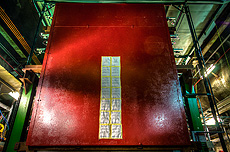 |
This striking red wall, in combination with scintillator paddles behind it (not seen in the photo), is known as the MINERvA veto wall. Located in the NuMI neutrino beamline 105 meters underground, the veto wall tags muons that come from neutrinos that interact in the rock upstream of the wall. The muons then pass through into the rest of the MINERvA detector (into the plane of the picture). Marking these particles as they enter the detector allows scientists to distinguish between the muons from upstream and those created in the MINERvA detector, behind the wall. The muons (and other particles) arising from the neutrino interactions inside the detector are the ones scientists want to measure to better understand neutrinos themselves.
Photo: Ruben Carcagno, TD |
|
Christina Love
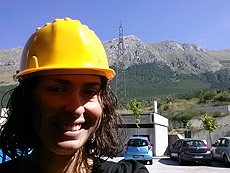 |
Christina Love works on the DarkSide experiment. |
NAME:
Christina Love
WHICH UNIVERSITY DID YOU ATTEND?
Temple University
WHAT EXPERIMENT ARE YOU ON?
DarkSide
WHAT IS YOUR RESEARCH FOCUS?
My graduate work focused on a prototype dark-matter detector. Based on its gravitational effects, dark matter has been found to make up almost 25 percent of everything in the universe. Experiments like DarkSide are searching for signals that can reveal the nature of undiscovered particles that make up the dark matter. Direct detection of dark matter has yet to be confirmed.
HOW DID YOU GET INVOLVED IN PARTICLE PHYSICS?
I spent the summer of 2009 at Fermilab working on radiation detection techniques. The DarkSide Collaboration was in its early stages.
WHERE DO YOU SEE YOURSELF IN FIVE OR 10 YEARS?
I see myself teaching at a university, heavily involved in outreach and education, and of course working on a very interesting astrophysics or particle physics problem.
DURING GRAD SCHOOL, WHAT WAS THE MOST UNUSUAL OR EXCITING THING YOU DID OUTSIDE OF PHYSICS?
My husband and I got married in the Edelman Planetarium at Rowan University during my last year in graduate school. We are both scientists and had met 10 years earlier at Space Camp!
WHAT ARE YOU GOING TO DO NOW?
I am currently an ORISE postdoctoral fellow at the Transportation Security Laboratory and an adjunct professor at Rowan University. I am looking for a faculty position in the Philadelphia area.
|
|
The plan for a promising future
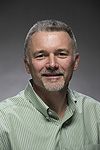 |
|
Randy Ortgiesen |
Randy Ortgiesen, head of the Facilities Engineering Services Section, wrote this column.
I am very pleased to report that the laboratory has just completed the Fermilab Campus Master Plan, which integrates the new Intensity Frontier vision with a sound strategy for infrastructure and facility investment, including modernization, consolidation and revitalization.
On July 1, Pier Oddone, Young-Kee Kim and Mike Weis gathered to sign the Master Plan, which culminated a nine-month effort led by Fermilab campus architect Gary Van Zandbergen. The laboratory Master Planning Task Force, which included expert consultation from the University of Chicago, the Illinois Institute of Technology and others, was an integral part of the planning process as well.
The plan is intended to be both aspirational and inspirational. In addition to confirming the locations chosen for future experiments such as LBNE, Project X, Mu2e and Muon g-2, the plan outlines how to preserve the lab's unique character; ensure that new facilities support cutting-edge research; encourage a sense of community; ensure environmental stewardship, sustainable design, safety and accessibility; and maintain a welcoming site for visitors. Most significantly, the plan identifies the value of a new Integrated Engineering Research Building connecting to Wilson Hall through a walking bridge—complete with a new experimental control room, conference center and meeting rooms. In the Industrial Area, new high-bay and consolidated machine shop buildings are proposed. These new facilities will allow for dramatically improved efficiencies by consolidating operations and demolishing many existing buildings and trailers that are functionally obsolete and geographically dispersed.
The Master Plan provides a holistic and integrated framework for future development of the major regions of the Fermilab site. The plan proposes major project needs through 2033 to effectively support future science regardless of the experiments constructed. High-level sponsorship is critical; now Fermilab has a plan that can be used as a point of dialogue with sponsors and stakeholders. In the near term, the next steps identified in the plan will ensure that site changes and upgrades are compatible with the lab's vision statement: to inspire the world and enable its scientists to solve the mysteries of matter, energy, space and time for the benefit of all.
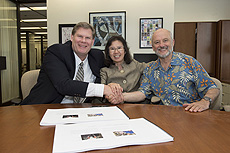 |
DOE Fermi Site Office Manager Mike Weis, outgoing Deputy Director Young-Kee Kim and outgoing Director Pier Oddone smile and shake hands after officially endorsing the Fermilab Campus Master Plan on July 1. Photo: Reidar Hahn |
|
ESH&Q weekly report,
July 9
This week's safety report, compiled by the Fermilab ESH&Q section, contains three incidents.
An employee felt a sudden sharp pain along his left shoulder blade while entering a vehicle. The Fermilab Medical Office diagnosed the injury as a neck strain. The employee received first-aid treatment.
An employee hurt his right knee after twice stepping into a depression hidden by tall grass. An immobilizer and medication were prescribed. This is a pending claim.
A subcontractor violated a lockout-tagout process while working in an accelerator enclosure. The incident is an ORPS Significance Category 2E violation.
Find the full report here. |
Signs of a stranger, deeper side to nature's building blocks
From the Simons Foundation, July 1, 2013
According to modern quantum theory, energy fields permeate the universe, and flurries of energy in these fields, called "particles" when they are pointlike and "waves" when they are diffuse, serve as the building blocks of matter and forces. But new findings suggest this wave-particle picture offers only a superficial view of nature's constituents.
Read more |
High-energy cosmos is violent with hint of dark matter
From New Scientist, July 3, 2013
The highest-energy map of the entire sky is part mayhem, part mystery. Created by NASA's Fermi space telescope, it reveals hundreds of examples of the most violent and explosive objects in the universe, plus a hint of mysterious dark matter.
For five years, the Fermi Large-Area Telescope has been in orbit around Earth, scanning the sky for gamma rays with an energy between 10 and 500 gigaelectronvolts—more energetic than any previously seen by satellites, but still too weak to spot from the ground.
Read more |
|